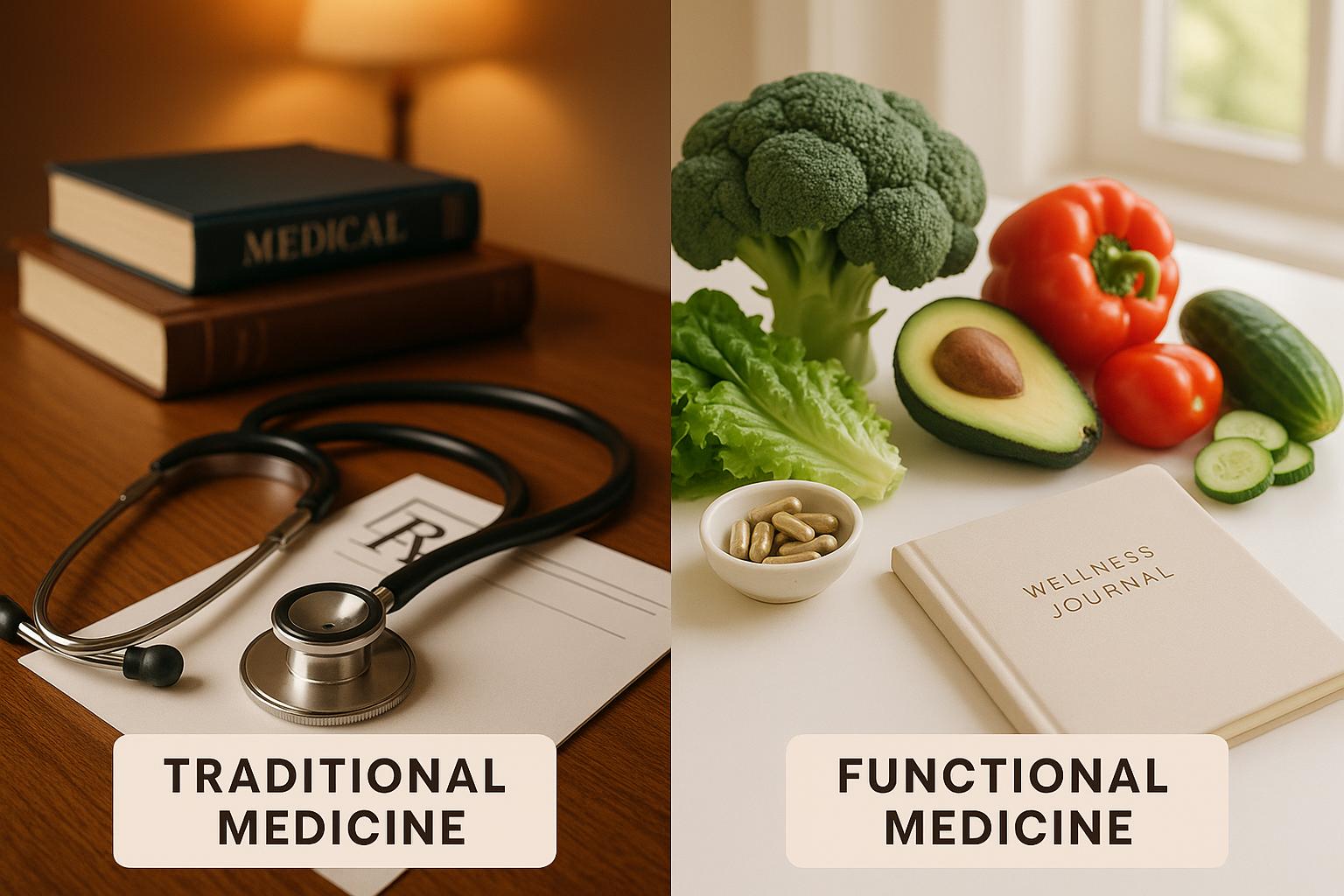Which approach to healthcare suits your needs better? Traditional medicine focuses on managing acute conditions with standardized, evidence-based treatments like medications and surgeries. Functional medicine, on the other hand, looks at root causes of chronic illnesses, emphasizing lifestyle, genetics, and personalized care plans.
Here’s a quick breakdown:
- Traditional Medicine: Best for emergencies, acute conditions, and symptom relief. Highly regulated and widely accessible through insurance but often focuses more on managing symptoms than addressing root causes.
- Functional Medicine: Ideal for chronic conditions and prevention. It involves in-depth assessments and personalized plans but requires more time, effort, and often out-of-pocket costs.
Quick Comparison Table:
| Criteria | Traditional Medicine | Functional Medicine |
|---|---|---|
| Focus | Acute care and symptom relief | Root causes and chronic conditions |
| Diagnostics | Standardized tests | Advanced, patient-specific tests |
| Treatment | Medications, surgeries | Lifestyle changes, natural therapies |
| Insurance Coverage | Usually covered | Often requires out-of-pocket payment |
| Time Investment | Short appointments | Longer, detailed consultations |
Takeaway: Many find combining both approaches works best – use traditional medicine for urgent care and functional medicine for long-term wellness.
1. Traditional Medicine
Core Principles
Traditional, also known as Western, medicine operates on a foundation of rigorous, evidence-based research. Its primary focus is diagnosing and treating specific diseases or symptoms using clinical guidelines that have been validated through extensive clinical trials.
This approach is disease-centered, aiming to match symptoms with established conditions and treat them using proven methods. For instance, a diabetic patient in New York would likely receive care similar to someone in California. This consistency – spanning medications, surgical procedures, and diagnostic techniques – is regulated by organizations like the FDA to ensure both safety and effectiveness.
Diagnostic Approaches
The diagnostic process in traditional medicine follows a structured path. It typically begins with a detailed review of the patient’s medical history and a physical examination. When needed, laboratory tests and advanced imaging are employed to pinpoint specific diseases based on measurable results, observable symptoms, and clinical signs.
Tools like X-rays, CT scans, and MRIs provide detailed views of internal structures, while blood tests can reveal cholesterol levels, infections, or even genetic markers. Specialized tests are also available to detect conditions like cancer or hereditary disorders.
While this approach is precise and systematic, it often prioritizes addressing immediate symptoms rather than uncovering deeper, underlying causes.
Treatment Methodologies
Traditional medicine offers a wide range of treatments, with prescription medications, surgical procedures, and advanced technological interventions leading the way. Medications are particularly central to managing chronic conditions. For example, patients with high blood pressure might be prescribed ACE inhibitors or beta-blockers, while those dealing with depression could receive SSRIs.
Surgical interventions are equally critical, especially in urgent situations. Emergency surgeries can save lives, and procedures like joint replacements can significantly improve mobility and quality of life.
The strength of this approach lies in its ability to deliver predictable outcomes and provide rapid symptom relief. It is especially effective in emergencies, such as heart attacks or fractures. However, while traditional medicine excels in acute care, it often falls short in addressing the long-term, root causes of health issues.
Effectiveness for Chronic Conditions
When it comes to chronic illnesses, traditional medicine plays a vital role in managing symptoms and slowing disease progression. However, it often struggles to address the lifestyle factors and underlying causes that contribute to these conditions.
Take type 2 diabetes as an example. A patient might be prescribed medications like metformin or insulin to regulate blood sugar levels. Regular lab tests are used to monitor glucose levels, and medications are adjusted to prevent immediate complications. While this approach helps stabilize the condition, it often overlooks contributing factors such as poor diet, lack of exercise, chronic stress, or inadequate sleep.
As a result, many patients with chronic conditions find themselves on multiple medications yet continue to experience persistent symptoms. This highlights the need for complementary strategies that incorporate lifestyle changes and preventive care alongside traditional treatments.
Furthermore, the standardized approach of traditional medicine can sometimes be a limitation in managing chronic diseases. Factors like genetics, environment, and personal habits often call for a more tailored, individualized approach to achieve better outcomes.
2. Functional Medicine
Core Principles
Functional medicine focuses on uncovering the root causes of chronic illnesses by examining the interplay between genetics, environment, and lifestyle. This patient-focused approach looks at how these factors work together to impact overall health.
"Functional medicine is a systems biology approach to health that delves deeper into the causes of illness and creates tailored treatment plans." – Dr. Stavy
By treating the body as an interconnected system, functional medicine acknowledges that an imbalance in one area can ripple through and affect other aspects of health. It prioritizes personalized care and preventative measures, empowering patients to take an active role in their health. This approach aims to address the staggering $4.1 trillion spent annually on healthcare in the U.S.. These principles form the foundation for the detailed diagnostic methods used in this practice.
Diagnostic Approaches
Functional medicine practitioners dedicate significant time to understanding the full picture of a patient’s health. They conduct thorough assessments, gathering detailed personal histories and using advanced lab tests to uncover the root causes of symptoms rather than just treating the symptoms themselves.
These assessments explore a wide range of factors, including symptoms, sleep patterns, diet, exercise habits, and stress levels, to identify potential triggers. Tools such as the Functional Medicine Timeline help map out key life events, family history, and genetic influences from birth onward, allowing practitioners to identify patterns and root causes.
Advanced testing plays a key role, measuring hormone levels, gut health, inflammation markers, nutrient deficiencies, immune function, and toxin exposure. Additional specialized tests are used to refine diagnoses further.
For example, Sophia, who suffered from chronic fatigue and digestive issues, underwent a series of tests. A Visual Contrast Sensitivity test revealed a biotoxin illness, hormone testing showed elevated cortisol levels, and a GI Map pinpointed imbalances in her gut health. These insights helped create a targeted treatment plan.
Treatment Methodologies
Functional medicine focuses on personalized care plans aimed at restoring balance through lifestyle adjustments, nutritional guidance, stress management, and natural therapies. Instead of relying heavily on medications, this approach addresses the underlying causes of illness with a combination of interventions.
"Functional medicine is an individualized, patient-centered, science-based approach that empowers collaborative, targeted care to address the underlying causes of disease and promote optimal wellness." – Institute for Functional Medicine
Treatment plans often tackle multiple triggers, such as inflammation, chronic stress, gut microbiome imbalances, nutrient deficiencies, toxins, hormonal issues, and food sensitivities. Patients are encouraged to actively participate in their recovery by making informed choices and adopting preventative strategies to support long-term wellness.
Effectiveness for Chronic Conditions
Functional medicine offers a promising approach for managing chronic conditions by addressing their complex causes. With 60% of American adults living with at least one chronic condition and 42% dealing with two or more, this approach provides alternatives to long-term medication dependency.
Take Rachael’s case, for example. She struggled with digestive problems, fatigue, and painful periods. Comprehensive testing revealed gut dysbiosis, nutrient deficiencies, sleep apnea, and hormonal imbalances. This information allowed her to follow a tailored treatment plan that addressed these interconnected issues.
"The functional interaction of our lifestyle, diet, environment, behavior, and social structure with our genome and epigenome greatly determines our health outcomes." – Jeffrey S. Bland, PhD, FACN, FACB
How does Functional Medicine differ from conventional medicine?
sbb-itb-d9e542d
Pros and Cons
Traditional and functional medicine each bring distinct strengths and challenges to the table, shaping how individuals approach their healthcare decisions. Below, we’ll break this down into a side-by-side evaluation for clarity.
Traditional Medicine Strengths
Traditional medicine is a cornerstone of emergency and acute care. Whether it’s a heart attack, a broken bone, or a severe infection, its standardized protocols and proven therapies are designed to save lives quickly. This system excels at providing fast symptom relief, backed by rigorous testing and validation.
Another advantage is accessibility. With widespread insurance coverage and established healthcare networks, traditional medicine makes routine checkups and urgent care readily available to most Americans.
Traditional Medicine Limitations
However, this model often focuses on treating specific diseases rather than addressing broader lifestyle or systemic factors. This can be a drawback when dealing with chronic conditions, as it may overlook the role of long-term inflammation, which contributes to over 70% of deaths worldwide.
Additionally, conventional appointments tend to be brief, leaving little room to delve into complex health patterns or lifestyle factors that might be driving chronic illnesses.
Functional Medicine Strengths
Functional medicine, on the other hand, excels in managing chronic conditions and prioritizing prevention. By examining genetic, environmental, and lifestyle factors, it aims to catch potential health issues early. This approach emphasizes patient education and collaboration, focusing on long-term health improvements.
"Functional medicine differs from conventional medicine in that it focuses on the underlying causes of chronic diseases and conditions, while the latter treats symptoms." – Dr. Stavy
Functional medicine also employs advanced diagnostic tools like detailed blood panels, stool analyses, and genetic testing. These methods can reveal imbalances that traditional testing might miss, allowing for highly personalized care plans.
Functional Medicine Limitations
That said, functional medicine requires a significant time commitment. Initial consultations are often lengthy, and the treatment plans frequently involve multiple lifestyle changes that demand ongoing effort.
Cost can also be a hurdle. Many functional medicine services aren’t fully covered by insurance, leaving patients to pay out-of-pocket for specialized testing and extended consultations.
Comparison Table
Here’s a quick comparison of how these two approaches differ:
| Criteria | Traditional Medicine | Functional Medicine |
|---|---|---|
| Acute Care | Provides rapid emergency care | Less suited for urgent scenarios |
| Chronic Conditions | Focuses on symptom management | Targets root causes and imbalances |
| Diagnostic Methods | Standardized tests and protocols | Comprehensive assessments with advanced labs |
| Personalization | Generalized treatments | Highly tailored care plans |
| Preventative Care | Limited emphasis | Strong focus on prevention |
| Time Investment | Short appointments | Lengthy consultations |
| Insurance Coverage | Typically covered by insurance | Often requires out-of-pocket payments |
| Treatment Speed | Quick symptom relief | Slower but aims for lasting results |
A Shift Toward Personalized Care
There’s growing interest in alternative approaches to healthcare. For instance, a 1998 study revealed that the use of alternative medicine in the U.S. increased from 33.8% in 1990 to 42.1% in 1997. This shift reflects a desire for more personalized and holistic care options.
Ultimately, both traditional and functional medicine serve important roles. Traditional medicine is indispensable for emergencies and acute care, while functional medicine provides a thoughtful approach to long-term wellness and chronic condition management. Many individuals find that combining these approaches offers the best of both worlds – rapid treatment when necessary and personalized strategies for sustained health.
Conclusion
Deciding between traditional and functional medicine depends on your individual health needs, goals, and preferences. Both approaches have their strengths, and knowing when to rely on each can empower you to make smarter choices about your healthcare.
Traditional medicine is unmatched when it comes to urgent care, surgical procedures, and addressing symptoms that require immediate attention. It also offers widespread accessibility, thanks to established insurance networks and evidence-based treatments.
On the other hand, functional medicine focuses on prevention and managing chronic conditions by digging into the root causes of ongoing health challenges. This approach takes a broader view, considering factors like genetics, lifestyle, environment, and biochemistry, making it a good fit for those seeking a more personalized and comprehensive strategy.
For many, blending the two approaches works best. Traditional medicine can handle emergencies and acute issues, while functional medicine supports long-term wellness by addressing the deeper causes of chronic problems. Together, they create a well-rounded plan for both immediate relief and sustained health.
If you’re considering functional medicine, be sure to verify the practitioner’s credentials and confirm whether your insurance covers their services.
Ultimately, your healthcare choices should reflect your lifestyle, budget, and priorities. Whether you lean toward traditional medicine, functional medicine, or a mix of both, the key is staying informed, collaborating with trusted professionals, and choosing a path that aligns with your unique health needs.
FAQs
How do I choose between traditional medicine and functional medicine for my health needs?
Choosing between traditional medicine and functional medicine depends on what you’re looking for in healthcare and the kind of treatment you need. Traditional medicine is focused on quickly diagnosing and treating symptoms, making it an excellent option for emergencies or acute conditions.
Functional medicine, however, takes a more personalized approach, digging into the root causes of health issues to promote long-term well-being. This approach is often better for managing chronic conditions, focusing on prevention, and supporting overall health.
If your main concern is quick symptom relief, traditional medicine might be the way to go. But if you’re seeking a more comprehensive, proactive approach to your health, functional medicine could be a better match. Think about your specific health concerns, lifestyle, and long-term goals to decide which path suits you best.
What are the pros and cons of combining traditional and functional medicine?
Combining conventional healthcare with functional medicine offers a more comprehensive approach to treating patients. This blend not only tackles symptoms but also digs deeper into the root causes of health issues. By integrating functional medicine’s emphasis on lifestyle, nutrition, and prevention with the proven treatments of traditional medicine, patients may receive care that’s more tailored to their individual needs. This can be especially helpful for managing chronic conditions and promoting long-term well-being.
That said, there are some challenges to consider. Functional medicine often involves higher costs, longer consultations, and, at times, differing philosophies that may not always align with standard medical practices. Additionally, some aspects of functional medicine have been met with skepticism due to limited scientific validation in certain areas. To make this combination work effectively, it’s crucial to choose healthcare providers who communicate openly and focus on addressing your specific health concerns.
Does insurance cover functional medicine, and how can I plan financially for these services?
Insurance coverage for functional medicine in the U.S. tends to differ widely. Many traditional insurance plans won’t cover functional medicine entirely, though certain components – like lab tests or imaging – might be partially included. To know exactly what’s covered, it’s crucial to check with your insurance provider.
When planning your budget, be prepared for potential out-of-pocket costs for consultations, specialized testing, and treatments. Some Medicare Advantage plans or state-specific programs may offer limited coverage for related services. To avoid surprises, confirm your coverage details ahead of time and consider that you may need to pay for some services directly.



